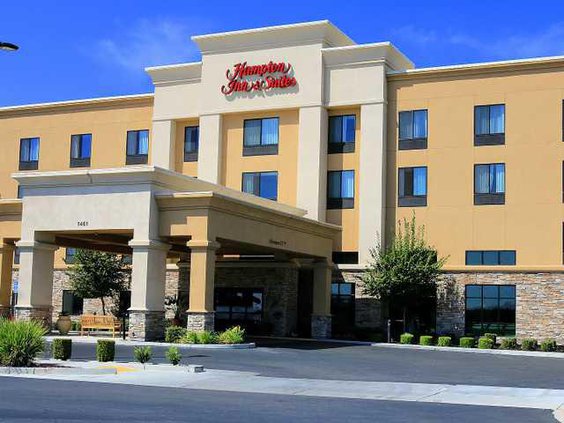Poag & McEwen has been talking with chains seeking to build a second 125-room hotel across from the Hampton Inn Suites at The Promenade Shops at Orchard Valley.
To make sure Manteca’s proposed new major road fee increase doesn’t kill any deal, Poag & McEwen is seeking approval of a development agreement to lock in the current Public Facilities Implementation Plan (PFIP) fees.
The new fee would slap a $4,472 charge per room for major road projects. That would bring the fee for roads alone to $559,000 for the proposed hotel.
The hotel — being pursued east of the existing 125-room Hampton Inn Suites along Atherton Drive — is the latest development that fees being pondered by the City Council to raise $306 million toward the cost of major road projects over the next 20 years could derail.
The developers of an 85,000-square-foot shopping center that SaveMart has been signed on as an anchor tenant on the southwest corner of Atherton Drive and South Main Street made it clear this week if the new road fees are put in place, it would kill that project as well. The proposed road fee by itself would increase the fees for the project by 75 percent going from $2 million to $3.5 million. That would make the fees as third as much as the cost to construct the shopping center.
It also could deep size efforts of developer Bill Filios to secure a deal with a major furniture store chain that wants to build a 125,000-square-foot store along the 120 Bypass. The new road fee would balloon the PFIP fee alone for the furniture store to $4.5 million. That is significantly more than the cost of the land.
While the city needs money for future roads, it also needs revenue that new retail and hotels will generate for the general fund to pay for day-to-day municipal services such as police, fire, streets, parks, and general government. The 10 percent city transit occupancy tax is projected to generate $1.1 million during the current fiscal year for the municipal budget.
The room taxes are now the fourth largest source of general fund tax and fee receipts surpassing business licenses that are pegged at $705,000. Hotel room tax receipt have been faster than the rate of the third highest source of revenue — franchise tax fees charged to PG&E customers on their electricity and gas bills as well as well as on Comcast cable TV bills. Franchise tax fees are now at $1,680,325.
Room tax receipts have doubled during since 2013 when they were at $545,000. It took almost four times as long — 15 years — for fees to double from the $252,178 collected in 1998.
A big chunk of the hotel tax growth has been credited to the Big League Dreams sports complex booking weekend tournaments that often fill up all rooms on Fridays and Saturdays. In recent years, mid-week demand has made vacant room scarce.
There are currently 448 rooms at four hotels that have been dubbed as top tier to snag tourists and other travelers. Based on current tax generation, the proposed 125-room hotel could contribute more than $300,000 a year in room taxes to the general fund.
The road fees by killing off retail would cut into the city’s ability to build its second biggest source of income — sales tax. General sales and use taxes are expected to generate $12.1 million this fiscal year. That is in addition to $5.9 million in public safety tax revenue form the half cent sales tax restricted to police and fire personnel expenditures.
Given that the hotel, shopping center, and furniture store could easily add $15 million plus to the property tax rolls, not having them built would ding the city’s No. 1 source for general fund revenue — property taxes. This year the city is expected to collect $15.2 million in property taxes.
Losing just the three projects alone would be the equivalent of losing property taxes from 38 homes valued at $400,000. It also would mean Manteca would miss out on between 200 and 300 jobs, depending upon what concerns located in other space at the proposed shopping center.
The city — as well as state economists — repeatedly underscore the fact those who stay in hotel rooms drop additional money in the cities where they stay to purchase gasoline, dine, or for entertainment. They also tend to shop at attractions such as Bass Pro Shops.
The revenue retail and hotels generate underscores the City Council decision this week to go back and look at the fees to determine if there are projects that can be dropped to cut down the cost.
The Planning Commission will consider the hotel development agreement when they meet Tuesday at 7 p.m. at the Civic Center, 1001 W. Center St.
FEES MAY KILL HOTEL DEAL
Plans for 2nd hotel at Orchard Valley in jeopardy, general fund revenue at stake





